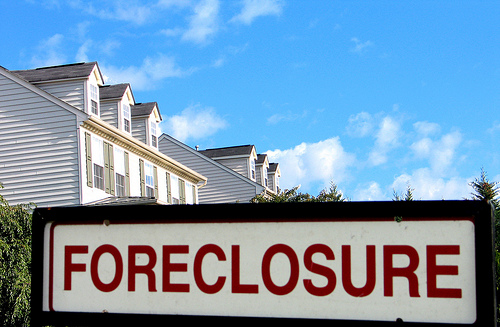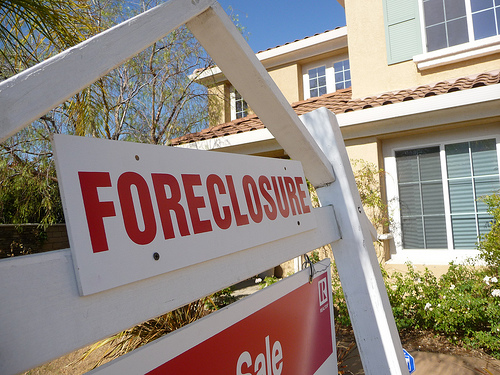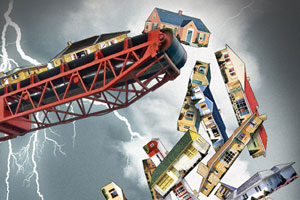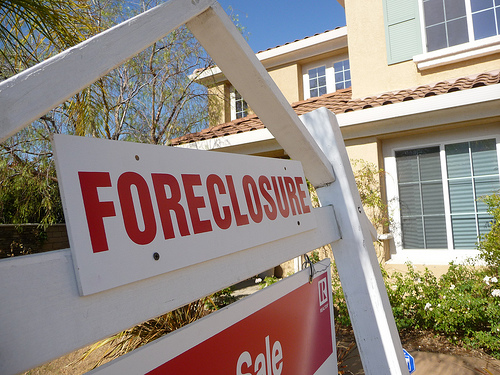
Flickr/bluesky
The New York Times‘ Sunday Business section leads today with a smart story on the foreclosure crisis down in Florida—the woefully backlogged courts, the contentious tactics the courts are using to plow through the backlog, and the powerful law firms used by banks to handle those hundreds of thousands of foreclosure cases. Mother Jones readers should recognize the multimillionaire foreclosure attorney the Times spotlights, 50-year-old David J. Stern: A month ago, I broke the full story on Stern, his rise to become Florida’s Ferrari-owning foreclosure king, and his controversial and lawsuit-riddled past. Moreover, my story on Stern, and on a breed of law firms (including his) dubbed “foreclosure mills,” showed how America’s biggest (and most bailed out) banks, not to mention the taxpayer-subsidized housing giants Fannie Mae and Freddie Mac, retain Stern’s sprawling operation and others like it to push through foreclosures using a high-pressure, assembly line-like process that’s often accused of steamrolling homeowners who get in the way. As it happened, not long after my story came out, in early August, the Florida Attorney General announced an investigation into Stern’s firm and two others like it.
The Times‘ story devotes an entire section to Stern but doesn’t include much not reported by myself and others. The story spends more time exploring the mess that is Florida’s judicial system, and how that system created new foreclosure-only legal divisions staffed by retired judges to process the foreclosure backlog, estimated at 471,000 cases. Late last month, I sat in on a morning’s worth of foreclosure hearings in one of these divisions in Broward County, the epicenter of the housing market’s boom and bust. As I described in my foreclosure-mill story, the hearings in Broward are an eye-opening experience: They take place in what’s essentially a wide spot in a drab hallway; literally you step off the courthouse elevator on the fifth floor and…there you are, in a foreclosure hearing, judge, attorneys, staffers, and all.
These particular hallway hearings concerned uncontested foreclosure cases, meaning it’s usually just the bank’s attorney on hand with no homeowner present. Standing near the front of the room was a woman who rattled off names of banks—US Bank, HSBC Bank, JPMorgan Chase, etc.—and then the names of anonymous homeowners, names like Judy Upton, Indira Llanos, Guy Marc Saint-Fleur. Under banks of fluorescent lights it was a grim scene, foreclosure cases announced, decided, signed, and sealed all in a matter of seconds. The woman doing the announcing sounded like an auctioneer, spewing one long monotone stream of names and banks and legal jargon. Occasionally convicts in blue and green jumpsuits straggled by, their arms and ankles chained together. In one hour this uncontested court dispatched nearly 165 foreclosure cases. Sitting there watching, I felt like I’d arrived at the place where the American Dream goes to die.
The fear among legal experts and foreclosure defense attorneys—like Margery Golant, quoted in both my story and the Times‘—is that this fast-paced foreclosure system, pushed ever faster by the banks’ lawyers, could steamroll homeowners who have a good shot at saving their homes. As Golant told me for my initial story, “The judges are so swamped with this stuff that they just don’t pay attention. They just rubber-stamp them.” Worse yet, some defense attorneys fear that having older, retired judges deciding complex legal matters in a rapid-fire setting poses even more problems. “They’re too fucking old to understand what’s going on,” one defense attorney, who asked to remain anonymous to avoid damaging work relationships, says of the senior judges. “It’s the truth.”
The Times mentions that the Florida legislature earmarked $9.6 million for this “foreclosure express.” The paper fails to mention that some of that money comes from Obama’s stimulus program. In other words, it’s all our taxpayer money funding the foreclosure express, which can hardly be said to create jobs.
Think of what’s going in Florida right now as the third act of the housing meltdown. There was the mania of the housing boom, then the market’s breathtaking collapse. We’re now witnessing the aftermath of that rise and fall. And Florida is unique in this because this kind of judicial crisis isn’t the case in other hard-hit states because Florida requires judicial handling of foreclosures. In Nevada and California, for instance, foreclosures are an administrative affair, far less costly and painful, but with fewer chances for homeowners to push back.
The goal of Florida lawmakers and judges is to clear 62 percent of the backlog by next July. Time will tell whether they reach that goal—and what sort of new mess they might leave behind.
















